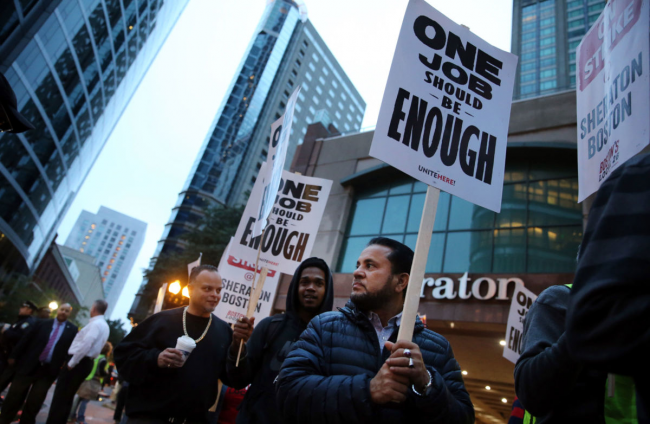Articles Menu

There have been millions of conflicts that reflect the fundamental antagonism between the working class and capital: in workplaces, in politics, in most of the institutions that help make the system tick. Through struggles, workers, sometimes in alliance with peasants, have won markedly better working conditions, protective laws, extensive social welfare provisions, even, in a few cases, sweeping revolutionary transformations. They have fought against racism and sexism and the destruction of Mother Earth. Indeed, the working class has significantly changed the world. And yet, the power of capital has remained intact, and many of the gains made have been rolled back, while the revolutions that offered such promise in Russia and China have either been destroyed or have moved so decisively toward capitalism that for all intents and purposes, they have been rescinded.
For the working class to truly change the world, workers and peasants, along with their allies, will have to adapt a strategy that aims to overturn every institution that rules them, radically altering the terrain in which they live their lives: the way food is produced, the technology developed, the manner in which politics is conducted, the geographical scale at which economic exchanges are made, the relationships of production, the control of schools and media. In other words, whatever capitalism has wrought must be terminated and the world built anew.
In this excerpt from the final chapter of my book, Can the Working Class Change the World?, I provide a vision of the world for which workers and the oppressed can fight – one that calls for a movement against and beyond capitalism.
***
To transform the world, we first must have at least a general idea of the world we want to inhabit, and second, we need to know how to go about bringing such a place into existence. We can start by stating that, if capitalism is the source of the multiple woes facing the working class and its peasant comrades-in-arms, then what we desire is the antithesis of capitalist society. This would mean the end of:
To put matters bluntly, the rule of capital must be terminated. Because everything that must end is central to the unceasing accumulation of capital, it is impossible to abolish any of these within the confines of this system. There can be some lessening of exploitation and expropriation, won through various forms of struggle. Wage laborers can win safer workplaces; civil rights laws can improve the lives of women and people of color; imperial wars can sometimes be averted, or poor nations can win a bit of economic independence; peasants can at least temporarily deny capital their land; a few decent politicians might win office; schools might improve some; and media might occasionally serve the public. But none of this subverts the ultimate power of the capitalist class, namely its monopoly of ownership of the world’s productive property.
However, if we accept that capitalism must be superseded, it is fair to ask with what. The answer many on the left give is that we should not be in the business of designing the details of a future society. We will develop these as we attempt to change the world, seeing what works and what does not in practice. Perhaps so, but can we not at least state in general but stirring terms what we seek? At a minimum, wouldn’t these demands be essential?
***
We cannot afford to settle for incremental changes that, even if they happen, never amount to what is qualitatively and radically different, and can soon enough be reversed and usually are. To believe otherwise is surely utopian. It is the radical upending of the social order that is now hardheaded realism, the only path forward. No doubt, it might already be too late. It will take time for a class riven with so many fundamental cleavages, by race/ethnicity, gender, and imperialism most importantly, to unify itself and destroy its class enemy. Mother Earth may take her revenge on us before that. In the meantime, though, best to do what we can, in whatever ways of which we are capable: by any and all tactics, everywhere, all the time, in every part of the capitalist system. Fight landlords, disrupt classrooms, take on bosses, write, nothing is unimportant. And as we do this, remember that those who have suffered the most — workers and peasants in the Global South, minorities in the Global North, working-class women everywhere — are going to lead struggles or they are likely to fail. Speaking of his native India, the revolutionary, Bhagat Singh, who was executed by the British colonialists in 1931 when he was twenty-three years old, said something still true: “The real revolutionary armies are in the villages and in factories, the peasantry and the labourers.” With humility, I offer them my solidarity. I hope we all do.
[Top photo: Workers and supporters picket outside the Sheraton Boston by Marriott in Boston on October 3, 2018. Building the world anew under a new social order is the hardheaded realism the working class must face. CRAIG F. WALKER / THE BOSTON GLOBE VIA GETTY IMAGES]